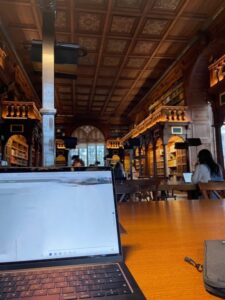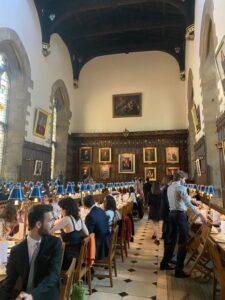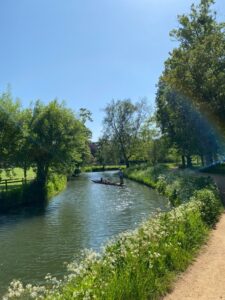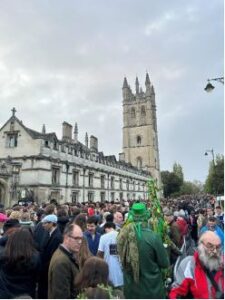Kategorie: ‘United Kingdom’
Writing my Master’s Thesis at the UCL
- Environmental Engineering M.Sc.
- United Kingdom, London
- University College London
- 09/2024 – 03/2025
Application
In January 2024, I applied to AVT (Aachener Verfahrenstechnik) at RWTH for an external master’s thesis at University College London (UCL). The AVT offers not only Erasmus places for process engineering students, but also external master’s theses at partner universities. I was particularly interested in topics related to fuel cells and water electrolysis, and looking through the partner universities I found out that I could combine research in this field with living in one of my favourite cities in Europe! After my successful application to AVT, I was put in contact with the exchange student coordinator at UCL’s Department of Chemical Engineering to find a topic and a supervisor. From UCL side, I had to apply as an undergraduate exchange student to be part of the official exchange student programme, even though I wouldn’t be taking any courses but would be working full-time in the labs. For this application I had to take an IELTS language test and submit a letter of recommendation, which was provided by the Erasmus team at AVT. After an online interview with one of the Associate Professors of the Electrochemical Innovation Lab (EIL), I decided on a preliminary topic for the thesis. Once these steps were completed, I was able to apply for my Erasmus+ internship grant and my UK visa.
Accomodation & Cost of Living

The view from my room in Camden ©Bia Brandt
As much as I love London, finding affordable accommodation can be challenging. UCL offers accommodation in the university’s halls to first year and exchange students. Accommodation in the halls is much more expensive than renting a room in Aachen, but still a good price for London. As I had already lived in London for an exchange semester during my undergraduate degree, I was not eligible for halls accommodation and spent my first two weeks in London looking for private accommodation. Especially in September a lot of people are on the lookout for a room as the university year is just starting. For my search I used Facebook groups and a website called Spareroom. Often rooms can only be rented on a yearly basis and for council tax reasons it is easiest for students to find accommodation in shared flats with other students. As well as finding rooms to rent, you can also use Spareroom to get in touch with other people who are looking for rooms. I went to a few flat viewings with a group of UCL students I had met through Spareroom. We didn’t end up renting together, but we remained friends for the rest of my time in London. The room I rented in the end was a six-month sublet in Camden and cost £950 a month. The area was great to live in (my favourite spot is Regents Canal) and I was spared many hot, stuffy and expensive tube rides as I could take the bus to UCL ☺️
Not only the rent, but the cost of living in general is a lot higher than in Aachen. Public transport is expensive, especially the tube if you use it regularly at peak times. Food in the UCL cantine costs ~£6 per meal (I always meal prepped as most of the students did). Also, there was a Lidl close to UCL where I usually did my shopping as the food is very reasonably priced there. There is an endless amount of things to do in a city like London. While eating out or going to the pubs will cost you a small fortune there are also things that can be done for free, as for example many of the museums. I can recommend the British museum which is just down the road from UCL, making it possible to visit the Rosetta stone during a lunch break.
Master’s Thesis in the EIL Labs

London at night ©Bia Brandt
On a day-to-day basis, I arrived at UCL around 9am and started working in the EIL labs. Mostly PhD students and research fellows work in the EIL labs and from the beginning I was part of the team and shared an office with the group. Compared to my previous research experience in AVT, I worked much more independently with different PhD students helping me where my research overlapped with theirs. I had a lot of freedom in where to go with my Master’s thesis, which was a very valuable experience, but also challenging at times. The labs and the work were sometimes a little less structured than I was used to in Aachen. However, everyone there was very helpful, especially in the first few weeks and when I was collecting my equipment, which was very valuable. Even though I was there for a Master’s thesis, I was treated like a PhD student, with bi-weekly meetings with one of the academic leaders of the group. I was not the only international visiting the EIL labs, there were two PhD students on a six-month visit for the same period as my Master’s thesis. Towards the end of my stay, another Masters student joined the EIL group for a research project. Overall, I felt very welcome in the group and even though I was the only one doing a Master’s thesis, it felt very easy to connect and spend time with the others both inside and outside of the labs.
Life at UCL & in London

Weekend walks along Regents Canal ©Bia Brandt
Needless to say, living in London is amazing! Over the course of my Master’s thesis I always took the weekends oft to enjoy the city. There is so much to do and even though I have spent 6 months doing all the touristy and not so touristy stuff, I still have things on my list. One of my favourite activities in London is to just walk around the streets or drive around in the red double decker busses as there is always something interesting to see.
Something I particularly enjoyed about studying at UCL is the societies. UCL has a very vibrant student community, and everyone can be part of it. When I went to the society fair at the beginning of my stay, I learned that there is a society for every hobby imaginable (ranging from a Taylor Swift Society to the Bubble Tea Society). I decided to join the Dance Society, the Hiking Society and the Photography Society (joining is very easy, you just need to pay ~£10 at the beginning of the semester to become a member). Joining the societies meant my calendar was full of social events from week one, but of course it took a bit longer to actually get to know the people in the societies. The society I enjoyed the most in the end was the Photography Society. How often do you get the chance to meet up with models (students from the modelling society) in a park in the middle of London and do a spring photo shoot as an amateur photographer?
Conclusion
The past six months have been incredibly intense, full of visits from old friends while making new friends. I had a steep learning curve academically through working more independently than I have before but also got the chance to dive into a more creative world through the societies and meet people who study something completely different from me. All of this in the setting of a huge and chaotic, yet also very beautiful city. Even though it took a lot of time to prepare and was an expensive time abroad, I am very glad I spent these six months in London ♡
Internship at Mercedes Formula One Team in the UK
- Business Administration and Engineering: Mechanical Engineering B.Sc.
- United Kingdom, Brackley
- Mercedes-AMG Petronas Formula One Team
- 07/2023 – 07/2024
Application/Finding an internship
The application process for the internship was quite lengthy and kicked off around September 2022 for a start in July 2023. In England, it is very common for students to include a year in industry in their studies, so you will find many available internships across various fields. The duration is usually one year because this is the standard period for university students unless it is a pure summer internship. Ultimately, the internship duration will depend on which internship you apply for and what is offered by the companies you are applying to. If it is a bigger, international company, it is very likely that they will help you a lot with the application process for a visa and put you on a company insurance scheme. This can differ significantly between companies. Following people from that company on LinkedIn can help you if internship positions become available as they are often shared there too.
Accomodation & Living expenses
While grocery prices are in a similar range as German grocery prices, the costs for housing and running costs such as electricity, gas, and water will be significantly higher in the UK. For me, they came out at around £80/month per person in a shared house with two other people, which is very high. Rent was over £500/month per person too, which is around what you can expect in this area and is comparable to what other interns living in or near Brackley had to pay as well. Still, this comes as quite a shock when moving to the English countryside from a German university city. Breakfast, lunch, and dinner were served in the company restaurant, and I usually ate lunch and dinner there for £2.80 per meal. The food was delicious, and the menu changes every week to offer great variety.
As Brackley is a small town, you will have to work through the local letting agencies’ websites, but there is a good network of incoming and leaving interns that provides opportunities to easily take over apartments, which I highly recommend. This also alleviates the pressure to buy furniture as the places either come furnished or you will be able to buy furniture off your predecessors at a low price. To be able to rent an apartment, you will need a valid visa. Many letting agencies will be understanding of these circumstances and offer to wait for your visa approval. After the visa gets confirmed, you can then take the next steps to set up a UK bank account, for which I recommend Revolut. Also, with a registered address, you will be able to apply for an NI (National Insurance) number, which is crucial for the company to pay you a salary.
Everyday life/ the internship

© Nicolas Musiol
Apart from the amazing work atmosphere and interesting projects that the team entrusted me with, you will work alongside a young team and will join the company with a group of around 40 interns/industrial placements (short IPs). Working on projects together, enjoying lunches and dinners in the Hub (the company restaurant), quickly formed a big group of close friends. You’ll find yourself very quickly going to the local pubs or to parties in Banbury or Oxford together. Out of the 40 IPs, there is always a good mix of internationals with Brits. My year had people from Australia, the US, Canada, Luxembourg, Austria, Germany, the Netherlands, Croatia, Ireland, and England, which made for a very interesting mix of people.
Many other sports clubs give you the opportunity to mingle with locals, as Mercedes has its own cycling club, a football team, and many sports courses. Outside of the company, you will find a tennis club, a rugby club, and a leisure centre with a pool, so there are plenty of activities for you to do in your free time. I would also highly recommend volunteering at the local football club. Every Wednesday around lunchtime, they organize a lunch for the elderly and disabled at the clubhouse, and they are always looking for a helping hand. They have lovely stories to tell, and you will find that many of them can give you great recommendations as they know the area inside out.
Free time/tips
Weekend trips with my newly found friends took me to Liverpool, Bath, Bristol, Cornwall, and on a ski trip to the French Alps, and many smaller adventures. A fantastic weekend activity is trying to complete all the local parkruns, which is a local run event held every Saturday at 9 am over a distance of 5 km. You can put all your running experience to the test by competing in the annual Silverstone Race in May, where you lap the race circuit two times for a race distance of 10 km. Great views along the way and thousands of participating runners make it a great event.

© Nicolas Musiol
Being located close to Banbury, which has a train station with a direct connection to Birmingham and London, one can hop on a bus to the neighbouring towns and villages to explore those or use them as a transit possibility to explore the country. A day trip or weekend trip to London is always great fun, and I’ve been many times now, as I’ve come to love London for the many different boroughs like Shoreditch, Camden, Kensington, Chelsea, and more. Each of them has a unique vibe, cool cafes, shops, restaurants, and pubs which are worth exploring.
Around Brackley, there are two airfields, both within walking distance. They make for a nice jog around them while small sports planes take off over your head or land on the small runways. For the daring, they even offer tandem parachuting. You can also visit the many golf clubs around and test your swing on the driving range. You only have to pay for balls as they will give you clubs to practice with if you don’t have any.
There are nice cafes all around Brackley as well, my personal favourites being The Old Fire Station in Brackley or the Post Office Café in Evenley. I can also recommend taking the bus to Oxford and visiting museums there, going punting on the canals, or visiting the local colleges.
There is also Stowe School in Buckingham only a few minutes away if you have a bicycle. The Stowe estate has a scenic park with many beautiful temples and arches. It makes for a nice afternoon stroll, especially on nice summer evenings.
Conclusion
All in all, I can only recommend committing to an international internship and immersing oneself in a foreign environment. Even though a full year exceeds the mandatory internship requirements of the RWTH, I can assure everyone it is an amazing experience, and I would do it again without a shadow of a doubt. I’ve greatly benefited from this year in the UK, not only professionally by working my dream job in F1 but also personally by meeting a lot of amazing people.
Research stay at the University of Oxford
- Business Administration and Engineering Mechanical Engineering M.Sc.
- United Kingdom, Oxford
- University of Oxford
- 04/2023 – 06/2023
Application/Finding an internship
During my master’s studies I developed an interest into various mathematical tools to model economic processes. Since I also wanted to take the chance to spend some more time abroad at the end of my studies, I decided to look for interesting chairs and institutes that align with my research interests to conduct my master thesis. Since the topic I was looking for was rather niche, there weren’t that many opportunities available and I quickly stumbled upon a research group at the University of Oxford after simple research on recent publicati

The reading room in the Old Bodleian Library.
© Jonas Schmänk
ons in my area of interest. With some background information on the coursework I have done previously and the research questions I was interested in, I reached out the administration of the institute. Luckily, two researchers reached out to me afterwards, stating that they have received my inquiry and would be happy to support the research for my thesis. After that, only some simple formalities had to be done for me to get an access card (“Bod card”) to the Universities’ libraries. I decided to physically stay in Oxford for the duration of one trimester (~2 months) since this didn’t require me to pay any fees to the University. This was a specific characteristic of the program of the receiving institute and does not necessarily hold true for other faculties as far as I know, so that should be kept in mind. The more “official” framework in which research stays in Oxford are processed through is the status of being a “recognised student”, which does require the payment of significant fees.
Accommodation & Living expenses
The University of Oxford consists of various colleges that typically provide for accommodation and food. Since I was a visitor to a specific institute and not a recognised student, it was unclear in the beginning whether I could make use of these services. Therefore, I decided to look for private accommodation. My receiving institute provided me with a short list of some possible opportunities and I decided to stay at the Commonwealth House, a well-located shared house affiliated with a local church at the rate of roughly 750 GBP a month including a simple but totally sufficient breakfast during weekdays in a common room with other tenants. While this seemed very pricey to me initially, this rate is more at the cheaper end in the center of Oxford and is similar to the ones that are paid for for college accommodation. Overall, I was content with the accommodation but for a prolonged period one might be better off with a different place, since the sanitary facilities and the kitchen were often in rather poor condition. As I found out later, often enough colleges do have some limited availability of rooms for non-members. To find out about that, a short email to the responsible person at the college is sufficient.

The dining hall at New College.
© Jonas Schmänk
As mentioned, breakfast was included most of the time at my accommodation. For lunch, one typically went to one of the very beautiful dining halls at the colleges, where a meal was available for between roughly 3.5-5 GBP. Groceries in the supermarket were available for a small premium compared to German prices. Overall, the ERASMUS scholarship made up for any additional expenses compared to my German student life.
Everyday life/ the internship
During my time in Oxford, I was highly flexible regarding my schedule. Typically, I started working at around 9:30 am and left at 17:30. While I had a work desk available at my institute, I often went to one of the beautiful old libraries Oxford has to offer. Since I worked on a rather programming-heavy task which didn’t require any other infrastructure than my laptop I was very flexible on where to work. Once a week, I met with my supervisors to discuss my progress and any open questions. Apart from the thesis-related tasks, I was able to join the seminars at my group, which included visits from various academics or presentations from group members regarding their current research.
Free time/tips
The possibility of activities outside of studying are almost overwhelming during term time. For once, there is probably a student society for any kind of interest. Let it be the Wine Society with frequent wine tastings, the Diplomatic Society with visits from international diplomats or the German Society with Germany-related pub quizzes, there are plenty of things to do. Furthermore, one should look out for associate memberships at one of the

Punting through Christ Church Meadows.
© Jonas Schmänk
colleges if one is not affiliated with any of them as a regular or recognised student. The colleges offer further social activities, that are split between undergrads in the Junior Common Room (JCR) and grad students in the Middle Common Room (MCR). To find out about possibilities to join them as an associate member, one should look for the respective constitution by just googling a specific college + “MCR” [or JCR, depending on where you are in your studies] + “constitution”. Luckily, I had the chance to join New College as an associate member and therefore gained access to their activities as well, with the most noteworthy being the chance to attend their formal dinners. While these came at a cost of roughly 25 GBP, they provided a three-course meal of very high quality and the chance to mingle with other people and bring friends from other colleges. Typically, a suit or cocktail dress was obligatory for these dinners. Also, the colleges often have their own sports grounds where one can play tennis, squash or even rent a boat to go punting. The latter is something that is definitely to be done when in Oxford. The many canals and rivers provide a very scenic view on the city and the nature surrounding it. Furthermore, the University itself has a vast array of interesting talks and speeches by renowned academics which opens up further opportunities to spend free time on.
If one finds time for other things to do, Oxford also offers many nice museums, medieval colleges and pubs (my favorite being The Old Bookbinders) to explore during the day or in the evening. Also, the surroundings are worthwhile a visit. London is only a 1.5-hour bus ride away as well. I personally found it hard to find time for activities outside of Oxford during my limited time there, since the city itself has so much to offer.
Conclusion
Overall, I can highly recommend an academic stay in Oxford. Not only does the renowned university attract interesting and diverse people from all over the world, but the city also has a unique charm with its medieval colleges and libraries, creating an unparalleled atmosphere.
Research internship at the University of Oxford
- Electrical Engineering, Information Technology and Computer Engineering, B. Sc.

May Day at Magdalen College Tower
© Benedikt Wahl - United Kingdom, Oxford
- University of Oxford
- 04/2023 – 09/2023
The questions, I probably got asked the most from friends and fellow students, is how I got the research
internship at the University of Oxford. That’s hard to answer since there is no clear path for that as far as I
know. I wrote e-mails to multiple professors at different institutions both in England and the United States
and one of them got back to me and offered me the internship in Oxford. Although there is always luck
involved, there is definitely one thing, I’d like to point out. Those professors get tons of similar requests
from maybe similarly suitable candidates. Hence, the application should be tailored to the lab in order for
the professor to even open the CV. In any case, I would always just give it a go and try it out.
Something to consider is that research internships are often unpaid. Although there are some scholarship
programs for internships in place, the money, you get, won’t cover all living expenses.
Regarding housing, the most convenient way is to text the housing officers of the colleges (I wrote an e-mail to all of them) and ask if they got free housing during the internship period. I got an offer from Exeter College and was really happy about it because it was easy to organize it from abroad. At the colleges,rent is usually paid per day, and comes in around 600-900£ per month from what I’ve heard. Something
that everyone should keep in mind is that the National Healthcare System (NHS) works different from the
German healthcare system. So I would highly recommend to register with a GP right upon arrival
because that gives you (1) an NHS number and (2) allows you to go to a GP faster when you need it.
Unfortunately, I didn’t know that and when I got sick, the earliest appointment, I was offered, was seven
days in the future. To get a faster appointment (at a private doctor), private travel health insurance can be

Duke Humphrey’s Library at the Bodleian Libraries
© Benedikt Wahl
very helpful. With that, I got an appointment the next morning.
So far this might have sounded a bit pessimistic but as soon as I got to Oxford, all the organizational
hustle was made up for. Hosting the oldest English speaking university in the world, the city is rich in
history and traditions which they preserved over the centuries. An event that I’ll never forget is May
Morning. On May 1st people from all over the city come towards the tower of Magdalen College. At 6 a.m.,
the bells of Magdalen college tower ring and the college choir sings to welcome the month of May.
Afterwards everyone walks through the city where plenty of other events take place. This tradition is
ongoing for over 500 years.
In general, the college structure makes Oxford stand out. To be part of this community as an intern, the
best way is to become an associate member of one of the middle common rooms (MCR). The middle
common rooms can be explained as a society for all graduate students at a college. Each MCR has it’s
own constitution which describes the conditions under which you can become associate member. At
Exeter College, that was pretty straightforward for me since living in their accommodation was sufficient
to request entry into the MCR. With the MCR membership at Exeter College, I got many perks including
subsidized lunch and dinner in the college’s hall (the dining room for students) as well as 24/7 access to
the college’s historical site. My favorite events, I could also attend thanks to the MCR membership, have

View from the garden of Exeter College over the Radcliffe Camera, University Church St Mary and All Souls College
© Benedikt Wahl
been formal dinners where we had really fancy food and dressed up in suits located in the college’s hall.
Formal dinners have been part of the college life for a long time and many traditions have been kept over
the centuries like the throne for the rector in the case of Exeter College. Besides the colleges, there are
as well plenty of other clubs and societies. In contrast to German universities, many of the sport clubs are
thereby really competitive since they compete on a national and international level. In general, Oxford is a
great place to connect to like-minded people from all over the world.
At work, there are some differences to German universities. To begin with, research groups tend to be
much smaller resulting in most professors supervising less students. My professor supervised just 4
students (including PhD candidates) and 2 post-docs. In addition to that, most researchers came to work
later than in Germany, resulting in the start of a typical working day just around 9 in the morning.
Overall, I really enjoyed my stay in Oxford and I will definitely stay in contact with my supervisor there in
the future.
Internship in London
- Architecture M.Sc.
- United Kingdom, London
- Outpost
- 03/2022 – 03/2023
The following notes are a collection of my experience and recommendations of my Erasmus year in London. I’ve put them in categories to make it a bit easier to potentially find answers to your questions. I’ve tried to keep it relatively broad so it’s not all about architecture and rather a guide to navigating a year in London. More so what to expect to happen in the background rather than specific locations or events. This focuses a bit more on students going abroad and specifically to London as interns rather than students. I suspect the experience will greatly differ depending on whether or not you do your Erasmus exchange as a student or as an intern. Things like accommodation, social life and money are probably where things will differ the most, as students can apply for student housing which will be cheaper than the general housing market (obviously there will be exceptions). Furthermore you will probably have a social circle from the get go, as there will be similar minded people in your courses or even other international students. Lastly you’ll probably not earn any money as a student. Depending on your visa (obviously subject to change) you might not be allowed to work, which can make living in London a little harder.
I really hope you can gain something from this list and that the numbers won’t scare you away from going. The great thing about a big city like London is that there’s always a way to make ends meet.
Architecture internship
- Finding a studio in London can be made slightly easier by following an architectural photographer on instagram as a photographer usually has a wide range
of studios to choose from showcasing their best and most recent works - I recommend calling people to show both initiative and how proficient you are in speaking English
- Studios are usually very busy so emails might get lost
- From experience I can confidently say that to going to a smaller practice will be way more beneficial in getting the right amount of one on one mentoring, more insights into multiple RIBA – stages and better opportunities to get to know your colleagues
- For my internship I applied to multiple studios with natural building materials as that wasn’t covered in my B.SC
“Salary”
- Be aware that the Erasmus grant won’t be enough to support you in London (Probably applies to the rest of the UK as well)
- Try to get a sense of what your potential employer will be paying you to determine how much additional funds you will need
- Aim for at least 700-800 £ as a modest room in zone 2 will cost about 600£ if you are lucky (London prices probably not applicable to the rest of the UK)
- If you’re planning on commuting to work via the tube account for roughly another £150 as travel in 2022 from zone 2→ 1 was 2,50 = 5£ a day
- A British bank account might also be worth considering as a European card might entail a lot fees (I recommend Monzo for this)
- Opening a bank account requires you to have an address. Your workplace address should suffice
Phone
- If you are struggling to get a decent internet connection l can recommend giffgaff as a provider
Accommodation
Important!
If you visit London as an intern and not a student you will find it difficult to find affordable accommodation as you can’t get into student housing!
- Living in zone 2/3 is definitely more than alright & also central enough! It will be a few hundred £ cheaper than zone 1 and offer the same lifestyle
- Be aware that travelling by tube everyday can add up and it might, again, be cheaper to pay more in rent than later on in tube fees as the season tickets are way to expensive
- From personal experience finding a flat can prove to be difficult. This was probably exaggerated by the fact that I arrived in London in early 2022, right after the pandemic, the war in Ukraine and the increase in energy prices resulting in a cost of living crisis in the UK, as well as a lot of migration in London as people were priced out of their current homes and in search for cheaper alternatives
- I would not recommend staying at a hotel for even a few weeks as even the cheap ones will drain your accounts. Try Airbnb to find a longer term solution to have a place to start searching from if you haven’t had the chance to do so before coming to London
- Airbnbs can be very costly as well so try looking in zone 3 if you’re staying in London. Your commute into central might only be 15 mins longer but you will save at least a few hundred pounds per month that way.
- For reference I had to spent almost all of my Erasmus grant in the first two months of staying in London just for accommodation
- Don’t be picky and take what you can get! You can always move later as renting culture in London is very different from Germanys and people are constantly moving. Usually the rooms are already furnished as people leave their stuff behind and don’t buy new furniture.
- Renting can require references from previous landlords. Sometimes it might be beneficial to ask your Airbnb landlord or your employers to offer their contact details as a reference if your future landlord wants to check if you can make your rent on time etc.
- In terms of utilities, be mindful that living in London means having to pay council tax! Depending on which borough, how many people live together and what employment status you have the tax can range from 30 to 150£ per month. ( As a student you are exempted from having to pay council tax, but if you are an intern you might have to pay and if you live with only students you have to pay the full tax that would usually be split with all the tenant that are not students)
Activities and getting to know people
- Starting an internship places you in an unusual situation as you normally work 9-5 which makes it a little harder meeting other people in your age group as they’re usually studying, meaning they probably have a different routine/rhythm
- I found that going to the gym for classes like yoga or boxing etc. can help meeting people after work organically
- Other activities like pottery is also a great way to get creative and meet people in the area
- An app I can recommend for meeting people in a new city is Meetup. Here you can search for different activities or interests and it will recommend events around you. Be careful though and don’t meet at a park at night or sth.
- Another App I can recommend is Dice, it shows you concerts and events in your area and it lets you buy tickets securely directly through the app
- Tuesdays is usually pub quiz night which means during the evening for a small fee people can form teams and try and find the answer to a couple of questions, another great way of meeting new people and usually the prize is a couple of free rounds of drinks
Writing my thesis at the Imperial College London
- Chemical Engineering M. Sc.
- United Kingdom, London
- Imperial College London
- 10/2022 – 04/2023
Preparation
Preparing for my time in London was simultaneously very easy and very stressful. For context I had 2.5 months time between my acceptance to the Erasmus scholarship and ICL and the beginning of my time in the UK. For most topics, such as getting a visa, finding a RWTH advisor, getting to London, etc. it was fairly simple to organize every thing. The most difficult task was in fact finding an apartment in London. As this probably takes the most amount of effort, I will start here.
Put simply, the London housing market is very expensive and the number of people searching for apartments seems to far outweigh the number of apartments available. Depending on the location and the size of the room, apartments seem to typically cost between £700-1200 per month, with the average being around £860 based on what I saw and heard from others. I had the most success finding an apartment via the websites Spareroom and Spotahome . If you already have a bachelors degree, Gradpad is another good place to look for apartments. The best method is to start messaging potential landlords early and to try and not be too picky with the offers you get. Many landlords are flooded with requests and will frequently not answer. In such a large city, it is normal to have a commute of 20-30+ minutes to the university, but due to the great public transport, living farther away from the campus should not be too much of a problem. The ICL campus I was located in is found in South Kensington, so I would base my search in the surrounding boroughs (districts). A cheap way to get to university is to take a bike, and the tube is also always a viable (although somewhat expensive) option.
I lived in Battersea and took a bike to and from university everyday which worked really well for me, although cycling in London is not quite as comfortable as cycling in Aachen.
For the duration of my stay, I was informed by the ICL International Student office that I needed to enter the UK under a standard visitor visa which allows a student to study in the UK for a period of up to 6 months. As a EU citizen and German national, I was not required to go through any formal applications or receive any formal documentation as there is an agreement which allows EU citizens to enter the UK as standard visitors without a visa.
Filling out the Traineeship agreement was fairly simple, I wrote a draft version for the agreement myself which I believed best fulfilled the requirements and sent this to both my RWTH and ICL advisors. I would recommend do this yourself and then possibly correcting the agreement as opposed to waiting for this to be done by someone else.
Finding an internal RWTH advisor was done by getting in contact with the Erasmus team from my institute (AVT). I then sent a description of the work which I wanted to do at the ICL (which had been agreed upon with my ICL advisor) and then a suitable advisor was found.
Arrival
Getting to London is fairly simple. There are a large number of airports to fly to, although it is likely the most comfortable to fly to London Heathrow. If you want to take a train, there is also a good train connection to get to London from Aachen. I personally drove my car to London via a ferry from Calais to Dover which allowed me to take a few more things with. This was also surprisingly easy. Important if you choose to drive in London: there is an Ultra Low Emission Zone for which you need to pay to be allowed to drive in London. By simply googling the Ultra Low Emission Zone and how to pay for it, you can save yourself from being fined. As usual with any sort of travel booking earlier is always better.
Living in London
London is a wonderful city to live in full of exciting things to do. No matter what it is you want to do, there is guaranteed to be at least 3 different places where you will be able to do it. There are a lot of opportunities to go out during the day or in the evenings with your friends. Sports, bars, clubs, museums, parks, the list goes on and on. Three things I personally took advantage of were the great selections of musicals that you can visit for a relatively affordable price, the great salsa/bachata dancing scene, and the wonderful green parks. However, being such a large city with so many things to do also means that traveling between locations often takes a significant amount of time (I felt like everything was always at least 25-30 minutes away from wherever I was). My way with dealing with this was to ride a bike between locations and then jump on the tube as necessary. Riding a bike in London requires a certain amount of confidence in your biking skills. The drivers in London are not very good and they tend to pay less attention/respect to cyclists than in Germany. So people won’t be running you over, but you also should be confident in taking space as it is available. Otherwise cars will try to squeeze by you which can become dangerous. That being said, the city is always improving for cyclists and there now exist a number of bike lanes which significantly improved the safety of riding through the city. I rented my bike from Swapfiets which was a great deal for just £19 per month with all repairs etc included, however there are also many Santander rental bike stations spread across the city with which you can also travel.
My impression of living in London is that the city has a lot to offer, and it is up to you to take advantage of it. I was almost always busy thing evening plans. But if you don’t actively look for things you want to do and make plans to do them, then London can quickly become a oversized and anonymous city which is not the best to live in.
Studying at ICL
As a Master’s student writing my master’s thesis, I was left with a lot of independence on how I wanted to study at the ICL. I worked in the Sargent Center for Process Systems Engineering and I was immediately integrated into the center as one of many other researchers. PhDs in the center work in large office spaces with individual desks, which gives a nice mix between social interaction amongst colleagues and still the privacy of your own work space. I was treated no differently from a PhD student and had my own desk from which I could work.
Being at a foreign institute, you are forced to take a lot of responsibility and initiative into your own hands. The professors at the ICL are some of the best in their fields, however they are busy people and expect you to be able to make steady independent progress. I had a weekly-biweekly meeting with my advisor where I could show my progress and get input on problems I was having. But as one would expect of a Masters student nearing the end of their degree, it is mostly up to you to solve small problems and come up with the direction of your work. I found this style of advising similar to my experiences in Aachen, so I do believe that RWTH students are well prepared for this style of work.
It’s important to keep an eye on what you need to do for the RWTH, such as the Erfassungbogen, etc. as the professors in Imperial will likely not know about these things and you will have to help shape your thesis so that it still fill the expectations of the RWTH.
Final Impressions
Overall I absolutely loved my time in London. Imperial is a world renowned university and things I learned have certainly helped me develop in new ways beyond what I learned in Aachen. I would highly recommend anyone thinking about traveling to London and the Imperial college to do so.
Experience Report on my Erasmus+ Traineeship at Bentley Motors in Quality Planning in Crewe, UK
- Business Administration and Engineering: Mechanical Engineering M.Sc.
- United Kingdom, Crewe
- Bentley Motors Ltd
- 08/2022 – 03/2023
I. Setup and visa
Where to begin…
This was probably the most nerve-wracking part of the entire Erasmus experience. I had my job interview in January 2022 while I was still on my internship with Porsche. During the interview I asked my interviewer and my future line-manager: “Well I really appreciate the chance to interview for the position, but do you know how we will deal with the visa requirements for the role?” to which he replied “If we decide to go with you as a candidate I will offer you all the support I can and if there is a will there is always a way”. Reason for asking this was obviously the Brexit which means that for all academic and job purposes a visa is required.
At the time of writing this there were two main visa routes to do an internship in the UK: The “GAE” visa and the “Skilled Worker Visa”. Unfortunately due to the high cost associated the latter was not an option. The Erasmus Programme generation until 2021 was a government approved exchange scheme eligible for a “GAE” visa which meant this was the only visa route I was able to take. This is why my internship was carried out as an Erasmus Placement. The subsequent Erasmus program generation is not eligible for this visa unfortunately.
You may think now “but why can you be an Erasmus student from the 2021 generation in 2023?”. The reason for that was that which generation you belong to is dependent on where the funding of the scholarship comes from. So the RWTH provided me the scholarship for an Erasmus Exchange from the budget of the 2021 program generation so I could actually get a UK visa for my placement. This method unfortunately ends working in May 2023 which is the end of the grace period given by the UK government.
For everybody trying to undertake an internship in the UK I heavily suggest getting in touch with the international office to explore options that are right for you. There is a list of government authorized exchange schemes for the UK on the gov.uk website. When you are in touch with a company you want to intern with, check if they have a contract in place with a company such as “Tier5Intern” or “ASGVisa” who offer authorized exchange schemes for foreign students. Plan at least 4 months (ideally 6) to deal with all the paperwork, errands and research required to make it happen.
It is a difficult path to be honest, but my line-manager was right with what he said to me during the interview. Best advice I can give on this matter is to stay persistent and encourage on-going communication between the international office, your company’s HR department, yourself and your manager.
II. Bentley Motors and the Quality Management role
Bentley Motors is a luxury car manufacturer based in Crewe, UK, known for producing high-end cars. The company has recently embraced new technologies and has focused on expanding its product range to include SUVs and electric vehicles. Bentley’s new strategy, called Beyond100, aims to become a global leader in sustainable luxury mobility, with a goal to become a fully electric brand by 2030 and to reduce its carbon footprint by 75% over the next decade. Key competitors include other luxury car brands such as Rolls-Royce, Aston Martin, Jaguar Land Rover, and Porsche.
As already mentioned, my placement was within the Quality Planning department. For me this role helped me expand my horizons in terms of work dynamic first and foremost. Because my previous role was production oriented, I was often pre-occupied with “firefighting” and dealing with new topics that came up adhoc. In my new team at Bentley the dynamic is very different. The quality planning department is split into two main branches. The first one is managing part approval and part maturation for new vehicle projects. The second branch primarily manages quality topics in the concept stage of a new vehicle project. Thus the work was overall more about looking ahead focusing on proactive quality management. That is why the placement helped broaden my horizon not just in terms of factual knowledge but also different workplace dynamics.
My placement project revolved around (re-)defining and writing the departments project deliverables in-line with Bentley’s new vehicle project management framework (in short PEP: “Product Emergence Process”). For this I held workshops with the relevant stakeholders to define who in the department is responsible for each activity within a certain process and then defining that process on a high level. This may sound tedious on the surface, but it was quite important since the department is measured against these deliverables as a vehicle project progresses. As part of this project I was able to improve my own project management, presentation and influencing skills.
Alongside this project I was also able to spend time in both sub departments because I made point to learn about the PEP-deliverables before attempting to define them. Thus I took part in various competitor benchmarking events, vehicle design assessments, went on supplier visits, took part in ergonomic studies, conducted maturity level assessments and of course, also spent some time with the product. In addition I got to learn about other functions such as our internal laboratory, production, product audit and the sourcing process in general.
One thing that stuck out to me is the difference in working culture between the UK and Germany. In my previous internship I found the company hierarchy to be quite steep for example. At Bentley the hierarchies are relatively flat compared to other Volkswagen group companies from what I can tell. I have also found that your formal education or position has a smaller impact on the way people treat you. In general people seem to give you responsibility and tasks purely based on your own ability which I find very positive. A lot of the people I got to meet had more varied work experiences compared to what I knew in Germany. Some of them have been in the military and then worked on the line before becoming quality engineers for example. Also there is a very large focus on upskilling in the job. So a lot of people I met worked their way into the position they are in organically, whereas in Germany people in similar roles all have B.Sc.’s and M.Sc.’s.
One thing I also quite enjoy is the “banter”. In Germany most people are very straight to the point and often quite serious. Contrary in England people tend “dance around” certain topics especially if they have a request. For example it is quite customary to have a short chat before getting to the actual point. Also people are more open to make a joke here and there to lighten the mood even at work (within reason). At first, I had to get used to these things a bit, but I find it makes day to day work much more enjoyable.
III. Experience in Crewe, UK
Bentley Motors is based in Crewe which is in Cheshire. I choose to live in Crewe during my placement year because I wanted to make sure I am close to my place of work. The reason being that even though Bentley has a flexible working system, I wanted to make the most of my time and be in the office as much as possible.
Crewe has both its good and bad aspects. I don’t want to sugarcoat it: there are probably more bad aspects than good. While it has a rich industrial history, the town has struggled with economic decline in recent years. As a result, the town may not be considered the nicest place to live by some. That said, living in Crewe is affordable, and it offers access to transportation links, making it a good base for exploring other parts of the UK and getting away from Crewe. For example it is easy to get to metropolitan areas such as Manchester, Liverpool, and London. If you are more in the countryside, it is also possible to get to Wales and various national parks such as the peak district from Crewe. Also most of the other industrial placement students lived in Crewe as well which meant it was good for my social life to not live in a prettier city nearby (for example Nantwich).
IV. Conclusion
Even though the process of getting the visa was cumbersome, the experience during the placement made it all the more worth to go through the effort. I got to meet a lot of interesting people both on and off the job from which I learnt a lot. Also I found that I quite like living in Britain in general and enjoy the culture.
In fact I enjoyed it so much I applied for a permanent position in the department I had my placement in. So with the end of my placement I started a new position in the role of “Senior Engineer – Product Quality” and ended up not returning to Germany to do my M.Sc. at the RWTH.
If that doesn’t speak volumes about how much I can recommend to anyone to undertake a similar work experience, then I don’t know what does.
V. Recommendations
In the last part of this report I would like to give some useful tips to anybody moving to the UK.
- To get paid you need a UK bank account: For this I can recommend “Wise” since you can open an account while you are still in Germany.
- For finding accommodation I can recommend the platform “SpareRoom” (for house shares) as well as Zoopla and Rightmove
- If you move into a house share a lot of them are “HMO’s”. This means they are not managed by a private group of people but a company. Thus don’t be surprised if you don’t get to meet your roommates before moving in. I recommend getting a property with a low minimum tenancy length so you can move relatively soon if you don’t like your accommodation or meet other people you would rather live with.
- Make sure to get a UK phone number as soon as possible. It will make your life much easier down the line. For a monthly contract I can recommend Smarty as a provider. Overall mobile contracts are much better and cheaper than in Germany.
- If you company offers a pension scheme, get on it asap and keep the related documents in a safe place. In essence this is the company giving you free money to invest for your retirement. All the returns from this are tax-free for life. Over the course of your placement this could add up to well over a thousand dollars from which you only invested a few hundred pounds of your own money.
My experiences in Bristol
- Electrical Engineering, Information Technology and Computer Engineering (M.Sc.)
- United Kingdom, Bristol
- Infineon Technologies U.K. Ltd.
- March 2022 – August 2022
I lived in Bristol for five months as part of the UNITECH programme. The programme aims to connect engineering students with each other and with companies and to promote the development of soft skills. Part of the programme is a semester abroad at one of the participating universities in Europe and an internship at one of the companies. I decided to do an internship at Infineon Technologies UK Ltd., which at the same time covered the industrial internship I had planned in my Master’s programme.
Through the UNITECH programme, I already had direct contact with Infineon’s HR department, which meant that there was no need for a traditional application process. I wanted to do the internship in a non-German-speaking European country and work on both technical and non-technical tasks. Therefore, a position in the sales area in Bristol was suggested to me, which I accepted after a discussion with my future supervisor.

© Maike van den Berg
I was paid like a graduate student for the internship, which in my eyes was a high salary for an intern by German standards, but not necessarily for young professionals. The funding of the internship as an Erasmus+ internship was especially helpful when applying for a visa.
Because of the Brexit, I needed a visa to be able to work in the UK. The process – as mentioned above – was greatly simplified by the Erasmus funding. I applied for a Tier 5 visa with the help of the RWTH. I had to apply for a Certificate of Sponsorship from the British Council, with the RWTH as the sending institution and the company as the receiving/host institution. With this Certificate of Sponsorship, I was then able to apply for the visa online.
I found a room in a shared house in Bristol through SpareRoom, which is similar to WG Gesucht. Living in Bristol is very expensive and I was lucky to find something affordable close to the city centre. Right at the beginning I bought a British prepaid card (ASDA Mobile) so that I could then open a bank account. It was all done online and I went to Lloyds Bank.
My experience in Bristol can be divided very well into professional and private.

© Maike van den Berg
The internship didn’t really live up to my expectations, partly due to the fact that my supervisor left the company a few weeks after the start of the internship and there was no real replacement, and partly due to the office culture at Infineon in Bristol. Due to the restructuring following the termination of my supervisor, I often lacked a direct contact person and received little feedback on my work despite repeated requests. This was depressing, especially because I had no experience in the sales field and was therefore often somewhat disoriented. However, the internship also included technical projects, which I enjoyed much more and which made me feel more comfortable in the team. In addition, there was little active social life in my office and most of my colleagues were much older than me. Even though I had consistently good experiences in direct contact, no real personal relationships were formed.
These rather disillusioning experiences were more than made up for by everything outside of work! Through my housemates, I had a lot of contact with people my own age locally. Unfortunately, I wasn’t allowed to join any societies at the university because I would have had to be a local student, but I did find a basketball team and made friends through it.
I found Bristol to be a great place to live. It’s a very progressive city with a great arts and culture scene and lots of concerts, some of which are free. There is an almost endless choice of vegan restaurants and many local ciders and beers. The harbour in the city adds to the atmosphere and there are many beautiful parks for warm summer evenings (I was very lucky with the weather during my time there!). Also, the proximity to Wales offers many opportunities for beautiful hikes in the hilly countryside. Unfortunately, the national parks there are not so easy to reach by public transport, so we often rented a car privately via Karshare.
Compared to Germany, the UK is more expensive in all areas. The cost of living was quite high and I found public transport especially expensive.

© Maike van den Berg
That’s why I bought a bicycle right at the beginning, which saved me a lot of expensive bus rides.
I am more than happy that I was able to do the internship in Bristol! The internship itself probably helped me the most in that I now know what is important to me in a future job and how I would (not) like to work. At the same time, of course, the insight into a large company was also interesting, as it gave me the opportunity to work with a wide variety of people at Infineon’s different locations.
Everything aside from the internship was what particularly enriched my time in Bristol. I found the British people I met to be incredibly friendly and open and I felt like I was living in a city where many things are possible.
Internship with Mercedes AMG Petronas Formula 1 Team
- M.Sc. Automotive Engineering and Transport
- Great Britain, Brackley
- Mercedes
- 19.07.2021 – 15.07.2022
General tips for other interns
Prepare everything early. All processes are very slow and I’m afraid this has nothing to do with pandemic situation. Even though it is stated that it will take a certain amount of time at most to process, it will most likely take longer.
Preparation
After BREXIT everyone needs a visa to do an internship in the UK, this is a long process and you need to be very well prepared. For an internship you need a Tier 5 Government Authorised Exchange visa (link). To be able to apply for this, one must have a so-called Certificate of Sponsorship (CoS). This can only be provided by your employer or another company on behalf of the employer. Alternatively, you can get one through RWTH (contact Shari Uszynski). For me it took a long time to get my CoS. In general I would plan about 1-2 months for it. The processing time for the visa is 3 weeks, but you can shorten it to 5 days for extra fees. From my experience, it still takes about 7 days for the visa to be ready. Application process is very well described on the government website.
Internship search
LinkedIn is very popular in UK. One can find very much information and job opportunities in LinkedIn. For this, before applying, one can try to contact employees of the potential host company to find out more about the company, city, etc. If you search for a company in LinkedIn, it will also tell you how many people from RWTH work there, which would be a good reason for your cover letter.
Now specifically regarding internship search in the Formula 1 industry:
I can warmly recommend the Formula Careers website (link). This is a website run by the mother of a girl who is very interested in Formula 1. You can find various useful information on the website, very interesting and motivating interviews and also job offers/internships. In addition, there is a so-called “Formula Careers Support Group” on LinkedIn (link), where many engineers and current/former interns from Formula 1 industry are present. I found my internship position with the help of this website/LinkedIn page.
Search for an apartment
For the apartment search I recommend the website https://www.rightmove.co.uk. If you can’t find an apartment, I recommend either renting an Airbnb or a room on https://www.spareroom.co.uk for the first few days of your stay.
Formalities on site
After arriving to the apartment (after quarantine, if necessary), one has to do some formalities:
- you have to register in a hospital. Sometimes you can do it online, but most of the time you have to go there in person.
- you have to pick up your BRP (biometric residence permit). You have 90 days to do this. However, this can change, so please pay attention to what will be written on the decision letter from the embassy.
- register for the tax ID (National Insurance Number).
Telephone/Internet connection
For students I recommend to take a sim card from VOXI (link). VOXI is a company of Vodafone, which is especially focused on students. The conditions are very good and there is no minimum contract period.
Bank/Account Opening
Since the UK has a different currency, you need a UK bank account to receive your salary. There are two options:
- you open a UK bank account normally at a bank located in the UK. This is only possible after entering the country, because you have to prove that you live in the UK.
- you can create a Revolut account (link). This is an app for the smartphone where you can change currencies. This app is very similar to PayPal, but is accepted as a payment option by many companies. For each currency you have a separate account in the app and you can exchange e.g. Euro to GBP. If you use the no charge version of this app and don’t want to pay monthly fee, you are limited with 1000 GBP money exchange limit per month. I myself use this variant. Bank account of Revolut is virtual, but you can order a bank card with it if you want. However, I have never seen that you can not pay with your smartphone anywhere in the UK.


